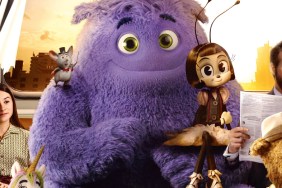Cast:
John Krasinski as Burt Farlander
Maya Rudolph as Verona De Tessant
Jeff Daniels as Jerry Farlander
Maggie Gyllenhaal as LN
Allison Janney as Lily
Chris Messina as Tom Garnett
Catherine O’Hara as Gloria Farlander
Paul Schneider as Courtney Farlander
Carmen Ejogo as Grace De Tessant
Jim Gaffigan as Lowell
Josh Hamilton as Roderick
Melanie Lynskey as Munch Garnett
Directed by Sam Mendes
Summary:
Simple and effective, “Away We Go” has a quirky charm that’s infectious due to the perfect pairing of Krasinski and Rudolph along with the decidedly different approach Sam Mendes has taken with the material.
Story:
When Burt and Verona (John Krasinski, Maya Rudolph) discover they’re going to have a baby, they decide to go on a road trip to find the perfect place to raise their kid and start a family, taking them from Phoenix to Montreal to Florida, visiting their dysfunctional family and friends, who all try to instill their own ideas of parenthood and family into the worried couple.
Analysis:
Having only been six months since “Revolutionary Road,” getting another film from director Sam Mendes is as jarring as it is a pleasure, even more so once you realize that that this is such a different movie from anything else he’s done in the past, especially the dour period drama. It’s also Mendes’ first film based on an original screenplay since the Oscar-winning “American Beauty.”
We meet John Krasinski’s Burt Farlander and Maya Rudolph’s Verona as they’re experiencing an intimate moment that ends in the revelation that she’s pregnant. Shortly afterwards, the couple learn that Burt’s parents, played so eccentrically by Catherine O’Hara and Jeff Bridges you immediately can believe they spawned Burt, are moving to Belgium before the baby is due. Since Verona’s parents died years earlier in an incident never fully discussed, the unmarried couple realize they’re free to move anywhere they want and they head off on a road trip to explore their options.
After this brief introduction, “Away We Go” settles into a steady clip as a road comedy with Burt and Verona traveling across the country, making stops along the way to meet various friends, trying to decide where they should set up a new home for their child. The genre has been overused in recent years, but here, it’s used as a way to delve deeper into that secret bond between couples, showing how they interact both privately and publicly, and exploring the real worries and concerns they face, whether it’s about having a first baby or deciding whether marriage is right for them. It’s not that surprising Mendes has taken on such mature themes, being that he’s been exploring them since “American Beauty,” but it’s the fact that they’re dealt with in such a realistic manner. Those who’ve gotten used to Mendes’ meticulous attention to detail, creating grandiose beauty and trying to capture it with the perfect shot, might be surprised by this movie’s decidedly low-key and naturalistic approach to everything. There are plenty of beautiful shots of the various places the couple visit, but the clothing and homes they visit are generally more drab to try to look more realistic.
Authors (and real-life couple) Dave Eggers and Vendela Vida deliver one of the strongest screenplays of the year, one that clearly requires an actors’ director like Mendes to pull together a cast that could make it work. Fortunately, he has done just that, beginning with the perfect pairing of John Krasinski and Maya Rudolph, who’ve been blessed with roles that allow them to show off sides of them we don’t normally get to see. Sporting glasses and a full beard, Krasinski switches things up by playing an unbelievably unapologetic dork, which probably isn’t too much of a departure, except it’s not tempered by his usual suave charm. Rudolph gives a surprisingly nuanced performance, one might only expect from a far more experienced actor, and you certainly might wonder why she constantly puts up with Burt. It’s virtually impossible not to love this couple, as we watch their growth from believing themselves to be f*ck-ups to realizing they’re not worse than anyone else they meet on their trip.
These eccentric encounters are realized by a diverse supporting cast who help bring out some of the film’s most memorable moments, whether it’s Rudolph’s tender moment with Carmen Ejogo, as her sister Grace, or the other crazy characters. At their first stop in Phoenix, they visit Verona’s former co-worker, a brash foul-mouthed harpy played by Allison Janney, a very funny characterization and the first of many clueless parents we’ll meet on their journey. Comedian Jim Gaffigan is just as funny as her husband, a man mortified into silence by his wife’s behavior. In Madison, Wisconsin, they pay a visit to Burt’s college “friend” LN (pronounced like “Ellen”), a pretentious New Age feminist played by Maggie Gyllenhaal, whose wild ideas about parenting include a hatred for strollers that borders on the psychotic. It leads to one of the craziest moments as Burt finally explodes out of exasperation with LN and her husband Roderick’s condescending advice on how they should have and raise their baby, a funny scene, but one that’s played so over-the-top compared to the rest of the film’s subdued humor that it’s somewhat off-putting.
After that, the film takes a decidedly somber turn as the couple visit their Montreal friends happily raising a group of multi-ethnic adopted children but who can’t have any on their own. It leads to a very dark moment that gets the couple thinking about what lies ahead, as does their next trip down to Miami to console Burt’s brother (Paul Schneider) whose wife has left him alone with their daughter. After the quirky humor that’s permeated the first half of the movie, this serious turn might throw some off since it seems to come from out of nowhere, but it’s such an integral part of this couple’s journey to try to find their proper home.
There have been many examples of a filmmaker falling so in love with their soundtrack it takes away from the movie; that’s not the case here. Rather than using his normal lush scoring, Mendes lets the film breathe, drawing more attention to Eggers and Vida’s terrific dialogue. Instead, he leans heavily on the folky pop music of Alexis Murdoch, using it just enough to create a mood, especially as the duo drive through the countryside. It’s certainly a similar technique as used in “The Graduate” and “Garden State,” and it’s sometimes used in manipulative ways like the way the final song allows the emotions to swell, but there’s no denying that it works.
The Bottom Line:
“Away We Go” certainly feels like Mendes’ most optimistic film and arguably his most accessible, yet it might not be for everyone, because like “Garden State” and “Eternal Sunshine of the Spotless Mind,” it’s the type of deeply meaningful film that requires an ability to remove oneself from the cynicism inherent in all of us. If you’ve experienced more than your share of life, this moving examination of the ups and downs of a relationship will definitely stick with you for some time.
Away We Go is now playing in New York and L.A. and will open in other cities on Friday, June 12.










